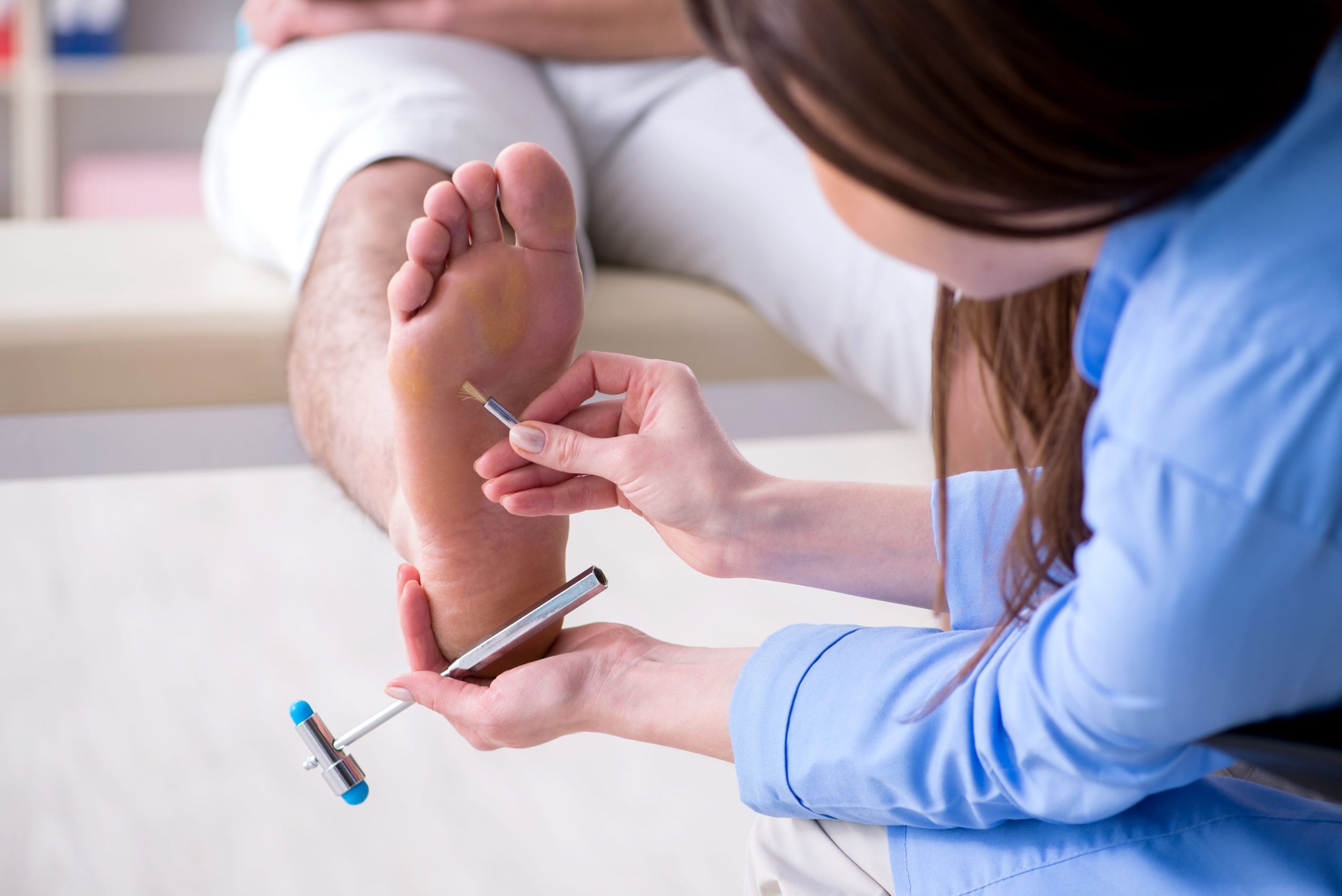
Peripheral Neuropathy
-
Pharmacological Management
Analgesics and Anti-inflammatories: Nonsteroidal anti-inflammatory drugs (NSAIDs) and certain analgesics like acetaminophen can provide relief from pain and inflammation associated with neuropathy.
Gabapentinoids: Medications like gabapentin and pregabalin are commonly prescribed to manage neuropathic pain.
Tricyclic Antidepressants: Agents such as amitriptyline and nortriptyline have demonstrated efficacy in alleviating neuropathic pain.
-
Physical Therapy and Rehabilitation
Strengthening Exercises: Tailored exercises aim to enhance muscle strength, coordination, and stability, ultimately improving ambulation and reducing the risk of falls.
Range of Motion (ROM) Exercises: These help maintain flexibility and prevent contractures, particularly in cases of chronic neuropathy.
Balance Training: Essential for individuals experiencing proprioceptive deficits, as it aids in minimizing the risk of falls and related injuries.
-
Neurological Modalities
Transcutaneous Electrical Nerve Stimulation (TENS): TENS units deliver low-level electrical currents to stimulate nerves, often providing pain relief.
Ultrasound Therapy: This modality can enhance blood flow and promote healing in affected areas.
Cold Laser Therapy (Low-Level Laser Therapy): Laser therapy has shown promise in reducing pain and inflammation associated with neuropathy.
B12 as a Treatment for Peripheral Neuropathic Pain
Peripheral neuropathic pain affects nerves outside the brain and spinal cord, causing symptoms like burning, tingling, numbness, and sharp pains, especially in the hands and feet.
Why Vitamin B12? Vitamin B12 is essential for nervous system health, aiding in nerve tissue repair and myelin production. Deficiency in Vitamin B12 can worsen neuropathic pain.
How the Injection Works Injecting Vitamin B12 near the posterior tibial nerve delivers the nutrient directly to the affected area. The posterior tibial nerve, running along the back of the lower leg into the foot, is a strategic location for treating pain in the lower extremities.
Procedure
Preparation: You'll lie down, and the injection site, usually around the ankle, will be cleaned.
Injection: A small needle injects Vitamin B12 near the nerve. You may feel a slight pinch.
Post-Injection: You may rest briefly and then resume normal activities.
Benefits
Pain Relief: Reduced pain and improved nerve function.
Nerve Health: Regular injections maintain nerve health and prevent further damage.
Quality of Life: Better mobility and comfort.
Safety and Side Effects Vitamin B12 injections are generally safe. Mild side effects may include soreness at the injection site or a mild allergic reaction.
Follow-Up: Dr. Husein may recommend a series of injections and regular follow-up appointments to monitor progress.
Conclusion Vitamin B12 injections at the posterior tibial nerve can effectively reduce peripheral neuropathic pain and improve quality of life. Feel free to ask any questions about the procedure.
Neurolysis
Neurolysis:
Definition: Neurolysis involves the surgical decompression or release of a nerve that is entrapped or compressed, leading to neuropathic symptoms.
Procedure: This can be achieved through various techniques, such as direct nerve release or the removal of surrounding tissue or structures that are impinging on the nerve.
Indications: Neurolysis is typically recommended when conservative treatments fail to provide sufficient relief and when a compressive lesion or entrapment is identified through diagnostic studies.
Nerve Decompression Surgery
Tarsal Tunnel Release
Common Peroneal Nerve Decompression
Nerve Decompression Surgery (e.g., Tarsal Tunnel Release, Common Peroneal Nerve Decompression):
Definition: This procedure involves surgically releasing compressed or entrapped nerves, often at specific anatomical sites like the tarsal tunnel or fibular head.
Procedure: During the surgery, the affected nerve is carefully identified and released from any surrounding structures causing compression. This aims to alleviate symptoms and restore nerve function.
Indications: Nerve decompression surgery is considered when clinical and diagnostic findings indicate nerve entrapment as the primary cause of neuropathy.


